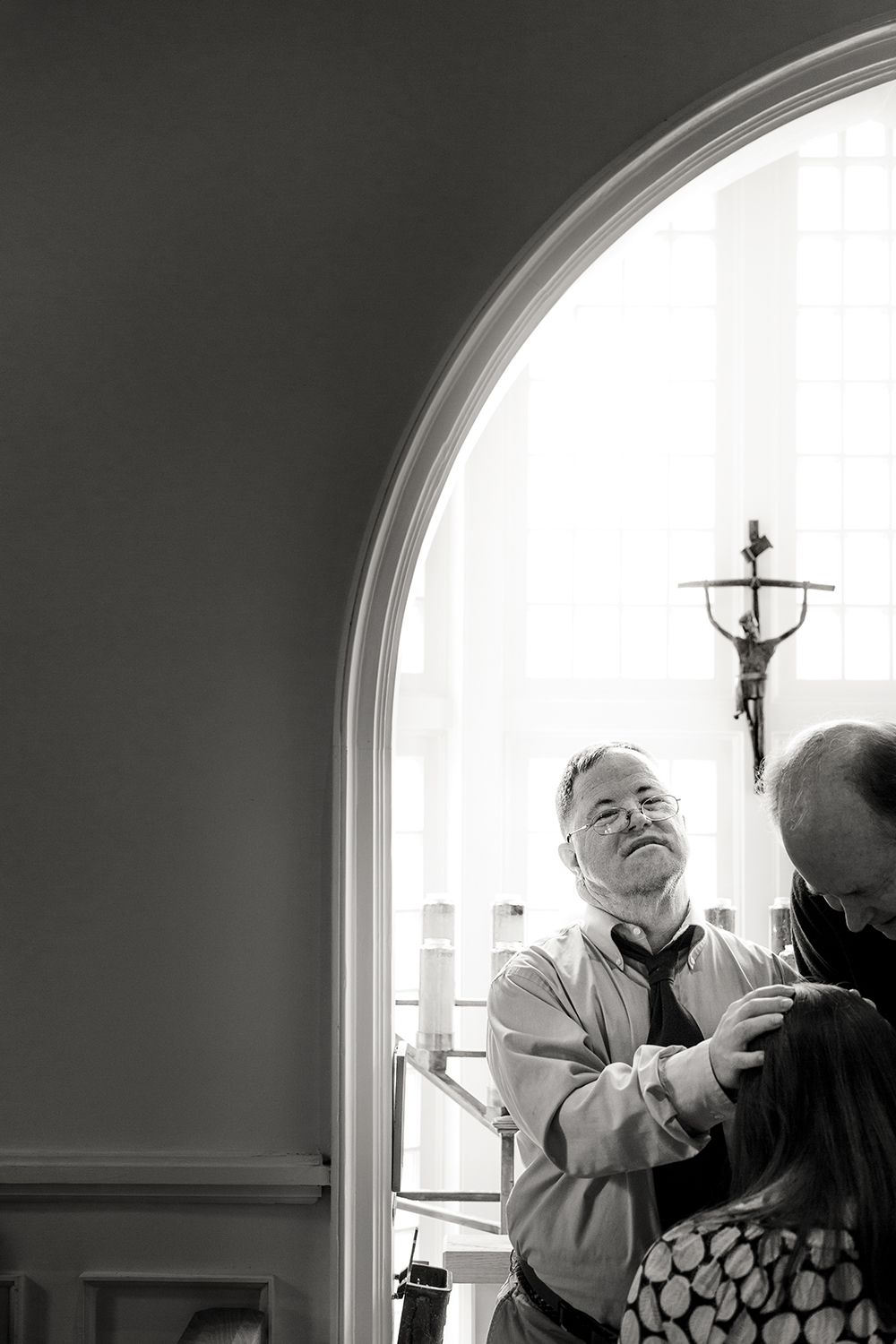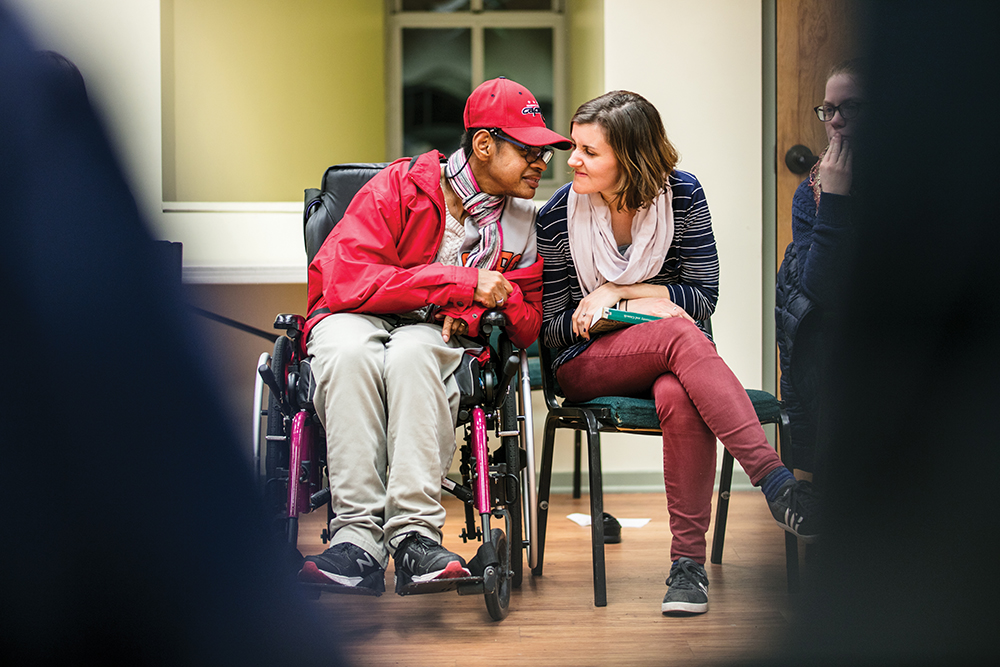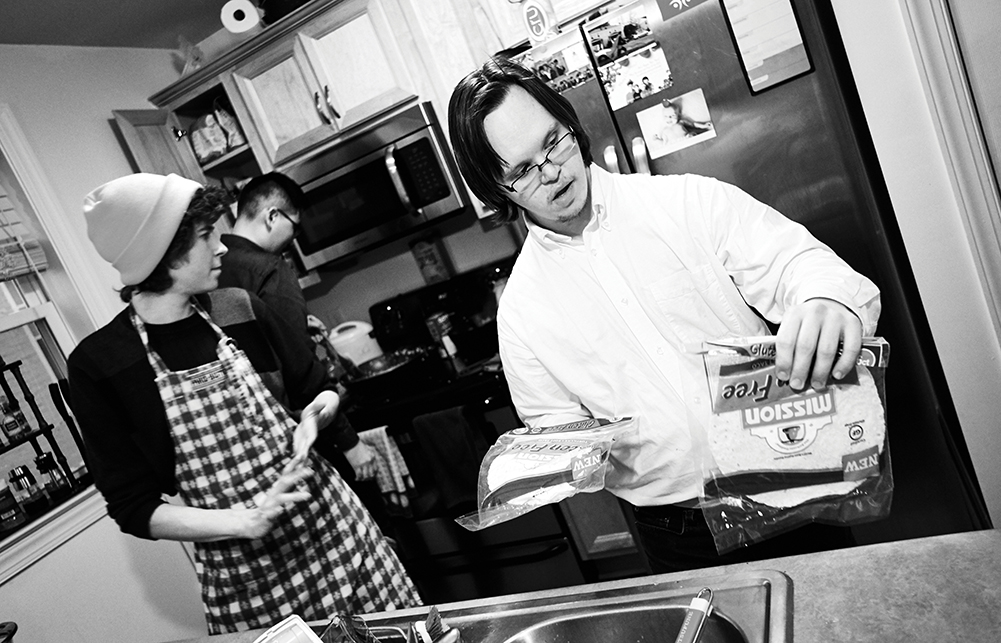“I can’t wait to see what kind of ministry she will have,” our friend said a few weeks after our daughter Penny was born.
His words surprised me. Penny was diagnosed with Down syndrome at birth. Her diagnosis swept away one set of expectations about what her life would hold. A different, bleaker set replaced them. In those early days, I did not imagine our daughter having “a ministry” to anyone.
 Ryan Donnell
Ryan DonnellMy friend’s words offered me a vision for our daughter’s future that I hadn’t considered. I already assumed Penny would teach me patience and compassion. I assumed she might help me see myself differently and help me understand my own brokenness and limitations. I assumed she would connect me to other people with intellectual and physical disabilities, and that these relationships might usher me into new types of ministry and help me discover new gifts.
But until that moment, I hadn’t considered whether God had gifted Penny for ministry in her own right. I suspect I’m not alone in the way I used to see Penny. Many Christians, if we’re honest, only see the needs associated with disability. But when we only see the needs, we miss out on the gifts.
People with intellectual disabilities are less likely to attend church than members of the general population. According to Erik Carter, a special education professor at Vanderbilt who studies religion and disability, 45 percent of Americans who identify as having a severe disability say they attend a place of worship each month—compared to 57 percent of all Americans.
Carter also reports that for those with disabilities who do attend church services, barriers to full and active participation are significant. Churchgoers with a cognitive impairment are less likely, by one-third, to participate in congregational activities outside of worship.
“We make a far too automatic assumption that disability means inability to contribute,” wrote Bill Gaventa, director of an annual workshop called the Summer Institute on Theology and Disability, in the Journal of Disability and Religion. “What if everyone has gifts, purpose, calling, and vocation?”
 Rayan Donnell
Rayan DonnellAs Gaventa says, most of us don’t just want to be receivers in the body of Christ—we want to be givers, as well. Most people with disabilities are no different. The sudden notion that my daughter was, like me, both broken and gifted forced me to recognize a fundamental truth about her and about others with conditions like Down syndrome, autism, and significant developmental delays: They, too, have been equipped by the Spirit to contribute to the loving work of the church in the world.
Yes, I have gifts to offer to people with disabilities and their families. But I also have needs, needs that may well be met through them.
An unsung priesthood
Our daughter Penny is 12 years old now, and we are starting to be able to name her ministry to others. It takes the shape of encouragement.
 Ryan Donnell
Ryan DonnellPenny goes out of her way to offer sincere and specific compliments. When she hears someone she loves is in any sort of need, she reflexively—even impulsively—reaches out. At age four, she learned that my grandfather had broken his hip and she immediately prayed, continuing to ask about his recovery for weeks. Now she is older and can convey her concern for people more directly. When my friend broke her collarbone, when a family in the neighborhood was preparing to move, when she learned her best friend had the flu, Penny immediately wrote notes expressing love and care.
More recently, Penny received a birthday card from our pastor. She sent a note in response: “Your words brought tears to my eyes when you told me God loves me. He loves you right back.” How many middle-schoolers write to pastors about God’s love?
 Ryan Donnell
Ryan DonnellBut maybe Penny was exceptional in her initiative to serve others. I reached out to friends, colleagues, and online communities to judge whether our experience was unusual. Responses flooded back. Although each example stands alone, together they tell a story of an unsung priesthood—of the body of Christ being enhanced and strengthened by receiving the ministry of everyone Jesus has called to be his disciple.
Take Gregory Riether. The 33-year-old sings in the choir at Friend to Friend Community Church in Ridgewood, New Jersey, where almost all of the 120 Sunday-evening worshipers have intellectual disabilities. Riether contracted viral encephalitis as a child, resulting in various neurological changes and cognitive challenges. His church “feels like joy,” he tells me. “I can only compare it to what the kingdom of God can be compared to. It is hard to describe.”
As members arrive on Sunday evenings, a church elder—a man with global developmental delays named John Kocienda—asks the congregation for prayer requests, which will be worked into the prayers of the people later in the service. Some write requests on slips of paper, others offer them out loud.
“Unlike any other congregation I have ever been in, they offer very thoughtful prayers for family, friends, each other,” says Joanne Van Sant, the church’s pastor. “They pray extensively for things that happen in the world—Puerto Rico, Texas. The news is on a lot in their group homes during the week, and they remember everything. They minister to the community, and the community doesn’t even know it.”
Unfettered prayers
Prayer, in fact, comes up often as a distinct way that those with intellectual disabilities minister to others, including people like Lori Galambos.
When she was a student at Duke Divinity School, Galambos lived in Friendship House, a residential community in Durham, North Carolina, that mixes graduate students and adults with intellectual disabilities. Modeled after a similar community at Western Seminary in Michigan, Friendship House consists of four apartments, each holding three students and one “friend resident,” usually a 20-something with some sort of intellectual disability. The 16 residents gather weekly for a meal, to share prayer requests, and to pray.
 Jillian Clark
Jillian Clark“There was always lots of conversation about singleness and dating because you had so many young people living together,” Galambos says. “It was a constant theme and a pretty constant source of angst.”
At the time, she was sad about being single but hesitant to name her pain in front of a group. Galambos remembers that Nathan Freshwater, a 29-year-old housemate with Down syndrome, prayed aloud about his own struggle with singleness.
Four hours north of Durham in Washington, DC, Luke Smith tells a similar story. The director of the L’Arche community there—where men and women with intellectual disabilities live side-by-side with neurotypical adults—talks about Charles Clark, an 82-year old community member who ministers to others through prayer and acts of service. Clark is tall and broad-shouldered, a gentle and steady round face behind his black-rimmed glasses. He started attending a local church and shook things up there seven years ago when he asked to go on a church retreat.
“The church was very unsure how to respond,” Smith says. “Charles went on the retreat and people recognized that he wasn’t just an older guy who is a half a beat off with his singing and his amen. His is the loudest and the last voice in the church. He is the prophetic voice in the church. He is the one who will pray for you and continue to pray for you.”
Clark is now the co-chair of the committee that plans this annual retreat. “I bring a lot of good suggestions like planning the food menu,” says Clark, who wears a jacket and tie for a Skype interview. “When we’re there, we talk about Jesus and the Bible and stuff like that.”
I ask him how he helps others, and he chooses his words carefully: “I care about people. You are supposed to love thy neighbor as thyself. I pray. I give hugs. I help when people need help.”
The warmest welcomers
Whatever the reasons that many people with intellectual disabilities are especially gifted in ministries of prayer—maybe they are less bound by social norms, more accustomed to expressing needs honestly, more aware of human vulnerability—it’s possible that the same factors also make them exceptionally gifted in ministries of welcome.
Amber Beery has seen it and has no doubt. She attends Immanuel Bible Church in Saginaw, Michigan, with her eight-year-old son. He is mostly non-verbal after a rare genetic disorder left him with global developmental delays.
“He is an informal greeter, giving hugs and giggles to people as they come in the building,” Beery says. “He gives friendship generously, regardless of the person’s status within the church or society.”
Jeannie Prinsen, a member of Bethel Church in Kingston, Ontario, has seen it, too. Her son, Jonathan, is 15 and on the autism spectrum. “Jonathan sees people in our church who perhaps are not the most popular or who might be considered a little odd or eccentric, and he knows them by name and calls out to them when he sees them,” she says. “He brings them a lot of joy.”
In the New Testament, James writes, “Has not God chosen those who are poor in the eyes of the world to be rich in faith and to inherit the kingdom he promised those who love him?” (James 2:5). All of these young people—who might be considered “poor in the eyes of the world”—minister to the people they encourage with their friendship. They also minister to the rest of the congregation as they bear witness to what it looks like to serve without favoritism.
When I put out a call for examples, my inbox overflowed with stories. Like one about a bulletin-wielding young man with Williams syndrome—a condition often characterized by excessive friendliness—who in a church context was uniquely equipped to serve as a greeter. Or one about Fritz Schloss, who offers a blessing to everyone in his congregation as they pass through the doors after the service. And there’s Hazel Pulliam, who welcomes each person who comes up to the altar for Communion. Some people wait in line to receive her embrace.
I’m not even including here the stories of those who minister in more structured church roles like ushering and serving Communion, or through cleaning and other tasks like setting up and breaking down worship equipment.
‘You better slow it down, dude.’
If ministries of encouragement, hospitality, and service are easy to wrap our minds around, the most powerful spiritual gifts of men and women with intellectual disabilities may be harder to articulate or codify. Where does one categorize the gift of a powerful presence?
Hunter Ross, one of two resident directors at Friendship House and a student at Duke Divinity School, says this about his highly physical roommate Alex Furiness: “It is such a healing thing for a graduate student who has been raised in the way of a success-oriented lifestyle and competition to come home to someone who just wants to tickle or wrestle and wants to watch sports and doesn’t care about the intelligent things I have to say.”
Quinn Holmquist is also a Duke student who lives in Friendship House, in an apartment with Freshwater, the man with Down syndrome who prayed about singleness. Holmquist admits that he struggles with busyness. Freshwater smiles knowingly and says, “He’s always pushing, but I say, ‘You better slow it down, dude.’ ”
Freshwater “has awakened creativity in both of us,” Holmquist says. “He is more creative than I am and more courageous and willing to take risks.”
The two composed a song together they call “The Friendship House Anthem.” It describes the welcome God has extended to all of them and how they have loved one another. The final verse sums up the mutual care and concern among these men: “Sing songs, pray prayers/ Cry tears, and share years/ We are family here/ I am for you.”
The five stages of incorporation
Somewhere between 1 and 3 percent of people in most communities live with an intellectual disability—a small figure, but significant enough to mean that almost any church that reflects the general population has at least one member with this type of condition. That presents a real challenge—and a real opportunity—for churches and parachurch organizations: How to enable individuals with intellectual disabilities to participate fully in the life of their local church so they can grow as disciples and ministers alongside their typical peers.
Churches have come a long way in recent decades in accommodating people with disabilities of all kinds, adjusting programming and adding amenities like ramps and railings to make participation possible. But challenges still abound—from the obvious physical barriers that remain unaddressed in many buildings, to less obvious obstacles like a lack of transportation for those unable to drive themselves to church.
To be sure, church leaders face challenges that feel very real when the prevailing culture devalues people with disabilities. A pastor of a mid-Atlantic Anglican church plant told me a few years ago about a man with intellectual disabilities in his congregation. This pastor loved him and wanted to involve him in services, but admitted he was also afraid that the man’s rambling prayer requests and sometimes-slurred speech would deter visitors from coming back.
Such concerns are understandable and maybe inevitable. But Jesus’ response is a description in Luke of a feast in God’s kingdom that includes “the poor, the crippled, the blind and the lame” (14:21)—everyone, in short, not typically invited to banquets.
Perhaps even more significant than physical impediments to participation, then, are the attitudes and assumptions held by the congregation toward people with intellectual disabilities. Dan Vander Plaats is director of advancement at Elim Christian Services, a Chicago-area ministry focused on empowering individuals with disabilities. He describes five stages churches often go through along the way to integrating the disability community into church life.
 Ryan donnell
Ryan donnellThe first stage is ignorance, in which people with intellectual disabilities are absent or ignored. This stage is followed by pity and then by care. Many churches stop at this third stage, with a sincere desire to attend to the needs of people with intellectual disabilities and a lack of recognition that these people have gifts to offer themselves—that they are not present simply to receive care. Vander Plaats articulates the fourth stage as friendship, in which meaningful relationships form. Finally, he names co-laboring, an ideological commitment to shared ministry, mutual appreciation, and giving and receiving that mirrors the apostle Paul’s vision of Christ’s body at work.
“We struggle to see what makes people with disabilities indispensable to the thriving of the body,” Carter, the Vanderbilt professor, told me. “We do not see ourselves as incomplete without the presence and participation—the gifts and friendships—of people with disabilities. And until we come to see that our own flourishing is ultimately linked to every part being present and valued, we are just not going to make meaningful movements toward becoming communities of inclusion and belonging.”
Paul articulated well a broad concept of who constitutes the body of Christ and who is integral to its functioning: “But God has put the body together, giving greater honor to the parts that lacked it, so that there should be no division in the body, but that its parts should have equal concern for each other. If one part suffers, every part suffers with it; if one part is honored, every part rejoices with it. Now you are the body of Christ, and each one of you is a part of it” (1 Cor. 12:24–27).
Jean Vanier, author and founder of the L’Arche communities, writes in his book Becoming Human, “It is not just a question of performing good deeds for those who are excluded but of being open and vulnerable to them in order to receive the life they can offer; it is to become their friends. . . . They will call us out from our individualism and need for power into belonging to each other and being open to others.”
A few weeks ago, I spoke with a woman who had recently received a prenatal diagnosis of Down syndrome. This mother already had two children, and this unexpected pregnancy had now become frightening to her. At one point in our conversation, she said, “Everyone says that kids with Down syndrome are a gift and that they teach you to be patient and compassionate.”
I remember feeling the same way she did—a reluctant willingness to allow our daughter to teach me things I didn’t really want to learn. I suspect some church bodies have a similar posture toward people with intellectual disabilities in their midst. Twelve years later, I feel far more eager to receive whatever Penny has to give. Yes, she has taught me patience and kindness. But she has given me so much more than a positive life lesson. In her perseverance, in her love for others, in her readiness to forgive—Penny is a role model to me.
My daughter doesn’t teach me simply by what she requires me to give her. She teaches me by what she gives me. She teaches me by who she is, not just by who she calls me to be. The same is true for every person with an intellectual disability who longs to be welcomed and to serve, who longs to belong to the body of Christ.
Amy Julia Becker is author of the upcoming White Picket Fences: Turning Toward Love in a World Divided by Privilege (NavPress, 2018). She lives in western Connecticut with her husband and her three children.
Have something to say about this topic? Let us know here.
















